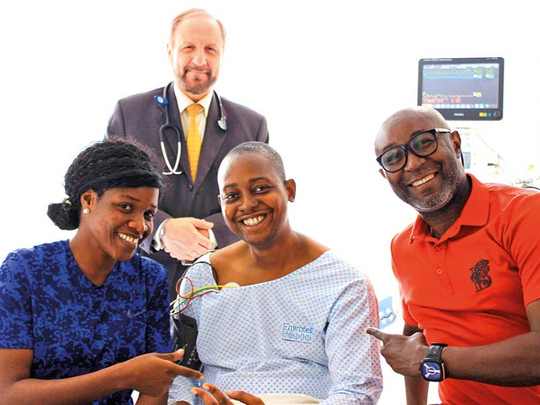
Dubai
If 36-year-old Sylvester E. had to stay in Nigeria, he may not have lived much longer. Thanks to Dr Allam Al Kowatli, Chief of Cardiovascular Medicine and Consultant Interventional Cardiologist at Emirates Hospital, Sylvester was able to travel to Dubai to receive the life-saving surgery that he needed.
What Sylvester needed was cardio balloon valvuloplasty surgery to open up a stiff tight valve in his heart that was causing him chest pain, trouble breathing and suffocation, palpitations as well as a host of other health-related problems.
When Sylvester began to notice problems breathing, while doing minor everyday activities, he made an appointment to see his physician in Nigeria, who told him he had a major problem in his heart.
However, realising he was dealing with a life-threatening condition, Sylvester immediately began to research online for the best interventional cardiologist who could diagnose his problem and perform the surgery, immediately.
After a 10-hour flight, Sylvester arrived at Emirates Hospital to meet Dr Al Kowatli and the clinical staff that would save his life. “I live in Nigeria and there wasn’t much help where I lived, so I found Dr Al Kowatli who immediately diagnosed my problem using special tests and the rest is history,” said Sylvester.
Dr Al Kowatli performed initial high-quality ultrasound, followed by laboratory blood work and other required health screenings to confirm Sylvester’s condition and the new important diagnosis causing his symptoms.
“The average person’s oxygen saturation level should be above 95 per cent, but in Sylvester’s case his level was 70 per cent well below what is necessary for blood to properly deliver and circulate oxygen through the heart, lungs, brain and other vital organs. The condition, if left untreated eventually leads to death,” said Dr Al Kowatli.
Dr Al Kowatli performed Sylvester’s nearly 5-hour surgery, under general anesthesia, by inserting a small, narrow, hollow tube (catheter) into a blood vessel in the groin area, advancing through the iliac veins, the large vena cava veins then into the heart. Once the catheter reached the stiff tight valve, a wire was advanced and a large balloon placed through the valve over the wire and inflated until the flaps (leaflets) of the tight heart valve were pushed away and opened. Once the valve opened, the balloon was deflated and the catheter removed.
“Because of his condition, Sylvester spent most of his days struggling to breathe, and if left untreated, Sylvester would have experienced heart and organ failure, leading to eventual death. But after his successful surgery, Sylvester was discharged after one day and was able to return home to Nigeria, hopefully to lead a perfectly normal and healthy life,” said Dr Al Kowatli.
Cardio valvuloplasty surgery is less painful and less expensive than traditional open-heart surgery. It is convenient, typically lasts 4 – 5 hours, and offers patients a speedy recovery.
Dr Al Kowatli is an American Board Certified Consultant Interventional Cardiologist, with a great success rate of achieving optimal results following complex cardiac interventions that typically exceeds 90 per cent overall.












